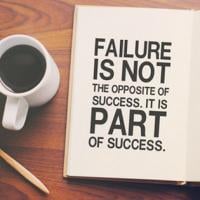How Failure Is Essential to Your Success

Failing is an essential activity in our lives, yet it’s so unpleasant to experience. We resent the negatives that come with failure: loss of self-esteem and confidence, giving up, thinking others are looking down on us, blaming others, and pretending it is not our fault. When we allow ourselves to dislike failure, it is these unhelpful feelings that we experience.
We need to embrace failure, because it precedes success. Each failure gives us a chance to learn and become better. No one is instantly successful at anything; everyone goes through a learning curve, and that may be steep and long.
Malcolm Gladwell talks about the need for practice in his book Outliers, where he argues that ten thousand hours of practice is required for mastery in a field. Even with innate talent, he says,“natural ability requires a huge investment of time in order to be made manifest.”
However much talent you are born with, in order to succeed, you will need to practice, fail, and practice again. Take the negative feelings and recalibrate them. Instead of loss of self-esteem and confidence, cultivate an open mind with a clear sight of what you need to improve. Instead of giving up, observe how much you have learned and how far you have come. Instead of worrying about what others think, you need to improve what you can improve and then ask for help if you need it.
At the bonus Women Who Test sessions at STARWEST 2016, Jamiee Newberry gave a talk about strategies for self-improvement, including small starts and restarting after failure. If you don’t practice, you don’t need to give up; just restart.
I also remember Women Who Test founder Alison Wade saying, “My resolve is not that every morning I go running; it is that every morning, I put on my running shoes.” Her point was that it is a small action that makes the next essential action easier.
Once we have made a start, the goal is then to increase the difficulty of what we are doing so that we are begin failing, learning a bit more, and, finally, succeeding. That gives us the chance to raise the difficulty a little more and start the process over again.
Isabel Evans is presenting the session My Failures in Software Testing (and the tutorials Human Factors for Test Automation: How People Affect Project Success and Influence Diagrams: A New Way to Understand Testing) at the STAREAST 2017 conference, May 7–12 in Orlando, FL.

